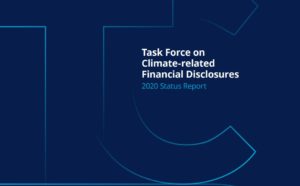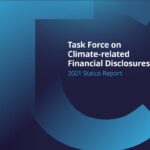
The Task Force on Climate-related Financial Disclosures (TCFD), established by the Financial Stability Board (FSB), published its 2020 Status Report today. Reviewing 1,700 companies’ reports using artificial intelligence technology, the Task Force found that disclosure of climate-related financial information aligned with the TCFD recommendations has steadily increased since the recommendations were published in 2017. The largest increases relate to companies disclosing how they identify, assess, and manage climate-related risk. Industries considered most exposed to material climate risk have led with the highest levels of TCFD disclosure.
To date, more than 1,500 organizations have expressed their support for the TCFD recommendations, representing an increase of over 85% since the 2019 status report. However, despite the significant momentum, the 2020 Status Report highlights the continuing need for progress in improving levels of TCFD-aligned disclosures given the urgent demand for consistency and comparability in reporting. In particular, disclosure of the potential financial impact of climate change on companies’ businesses and strategies remains low.
“The work that governments and businesses are doing to address the devastation caused by the coronavirus is also an opportunity to build a stronger, more resilient, and more sustainable economy – and transparency and disclosure have an important role to play,” said Michael R. Bloomberg, Chair of the Task Force and Founder of Bloomberg LP and Bloomberg Philanthropies. “The more companies know about their risks and opportunities related to climate change, and the more information investors have, the better we’ll be able to allocate resources and make progress – so it’s encouraging to see leaders in the public and private sector implementing the Task Force recommendations, as outlined in this report.”
Other key findings from the Task Force’s review of company disclosures, insights from users, and other research include:
- On average across the TCFD recommendations, 42% of companies with a market capitalization greater than $10 billion disclosed at least some information in line with each TCFD recommendation in 2019. Furthermore, disclosure levels for these companies exceeded 50% for certain information under the Task Force’s recommendations related to strategy and climate-related metrics.
- Nearly 60% of the world’s 100 largest public companies support the TCFD, report in line with the TCFD recommendations, or both.
- Energy companies and materials and buildings companies are leading on disclosure, with an average level of TCFD-aligned disclosures of 40% for energy companies and 30% for materials and buildings companies in fiscal year 2019.
- Expert users of disclosure identified the impact of climate change on a company’s business and strategy as the “most useful” information for financial decision-making.
- Asset manager and asset owner reporting to their clients and beneficiaries is likely insufficient.
The report also provides an illustrative ‘roadmap’ for preparers by highlighting insights from expert users on which information is most useful for decision making.
“Investors are increasingly demanding climate-related disclosures from the companies they invest in, and this demand is driving global momentum around the TCFD recommendations across financial and non-financial sectors,” commented Mary Schapiro, Head of the TCFD Secretariat and Vice Chair for Global Public Policy at Bloomberg LP. “We have provided a foundation that is improving the quality and consistency of this type of disclosure, and may help encourage a standardized approach across sectors and regulatory jurisdictions. We look to companies and investors to utilize the tools we have provided to accelerate the pace of progress.”
FSB Chair Randal K. Quarles said: “The TCFD recommendations support greater consistency in climate-related risk disclosures by companies around the world, which will help to prevent market fragmentation. The report shows that there has been significant momentum around adoption of and support for the TCFD’s recommendations, while also highlighting and making proposals to address challenges to more consistent and robust implementation.”
To support companies’ implementation efforts, the Task Force is issuing two guidance documents with the release of this status report:
- Guidance on conducting climate-related scenario analysis; and
- Guidance on integrating climate-related risks into existing risk management processes and disclosing those processes.
The Task Force also seeks feedback on its consultation on decision-useful, forward-looking metrics for the financial sector. Publication of the consultation document today begins a 90-day public consultation period, ending January 27, 2021.
The 1,500 TCFD supporters include companies, financial institutions and governments, among others, with company supporters alone representing a combined market capitalization of $12.6 trillion, and the supporting financial firms being responsible for assets of nearly $150 trillion.
View the webinar of Sustainalize ‘The Importance of Climate-related Risks’



